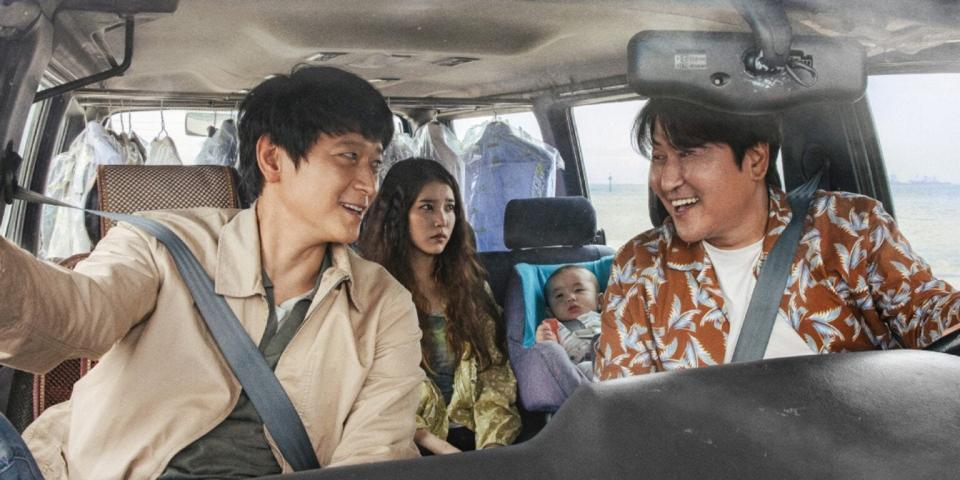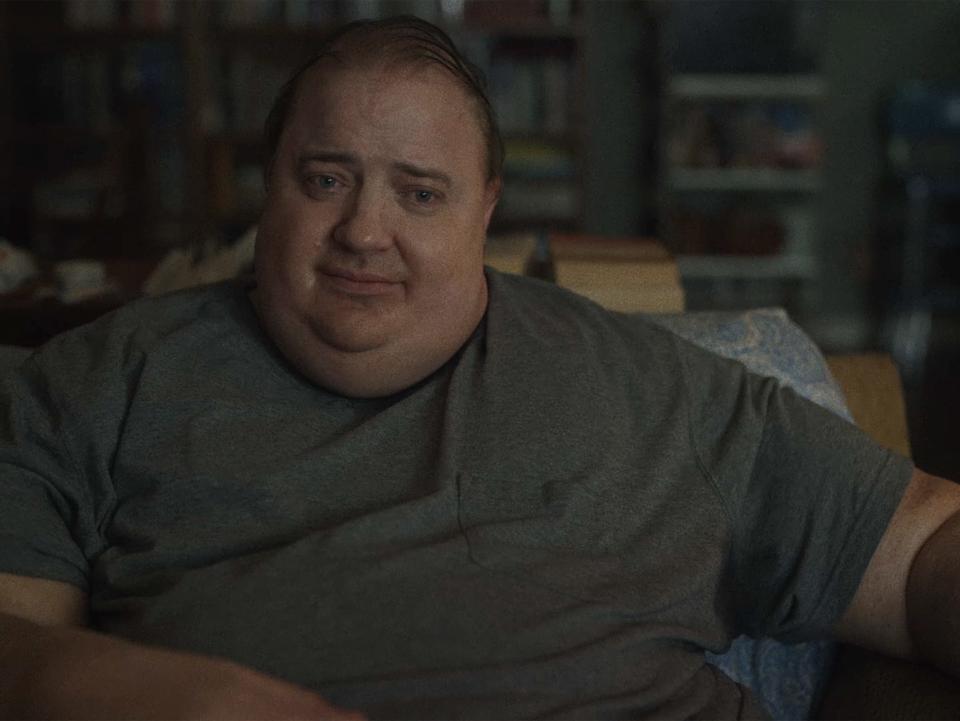Tom Hanks is a curmudgeon with a heart of gold in crowd-pleasing 'A Man Called Otto'
- Oops!Something went wrong.Please try again later.
To usher in the new year, and just prior to next week’s Golden Globes, Hollywood is going wide with a number of its Oscar hopefuls. So, to help you separate the pretenders from the contenders, here are my takes on which to see and which to skip:
'A Man Called Otto' is a crowd-pleaser
Tom Hanks gets in touch with his inner Larry David as the curmudgeonly sexagenarian at the heart of Marc Forster’s lukewarm English-language remake of Hannes Holm’s Oscar-nominated “A Man Called Ove.” Hanks is in full get-off-my-lawn mode as Otto Anderson, the self-appointed caretaker of his quaint Pittsburgh apartment complex. When he’s not berating his fellow tenants for not closing the gate or poor parking etiquette, the widowed retiree is busy attempting to off himself in an effort to hasten his reunion with his recently departed wife, Sonya. We know he’ll never succeed, simply because Otto is Hanks. This is also why we never buy Otto’s perpetual grouchiness. Yet, despite the unrelentingly obvious script by David Magee ("Finding Neverland"), anyone with half a heart will succumb to Hanks’ affecting turn. You come for him, but you leave marveling over his marvelous unknown co-star, Mariana Treviňo. She’s Marisol, Otto’s new Mexican neighbor, a woman so infused with sunshine and optimism, you want to believe such a saint walks the Earth. Not even her dopey husband or a fourth pregnancy can dampen her spirits. But might Otto? The movie spends an inordinate amount of time reminding us she’s not Otto-immune, as she blithely endures his various protests. Deep down, she knows he’s a good person. Unfortunately, so do we. So, Forster ("Monster's Ball") expects us to wait more than two hours to witness the transformation we’ve foreseen since the opening minutes. What keeps you sticking around is the intoxicating chemistry between Hanks and Treviňo. They are an endearing pair. Oh, and be sure to look for Hanks’ son, Truman, portraying Otto in the film’s flashbacks, which incrementally reveal the root cause of the old coot’s misery. Like everything in “Otto,” young Hanks is prepackaged for maximum crowd-pleasing pleasure. Call me a sucker, but I fell for it. So might you. See it in theaters beginning Jan. 6. Grade: B-
'Top Gun: Maverick' to 'TÁR':Favorite films of 2022
A royal rebellion in 'Corsage'
Since her breakout performance in P.T. Anderson’s “Phantom Thread,” filmmakers haven’t quite figured out how to fully use Vicky Krieps. At least not until writer-director Marie Kreutzer came along with this delicious offering in which Krieps excels as the beleaguered, sex-starved Empress Elisabeth of Austria. It’s set mainly in 1778 on the occasion of her highness' 40th birthday. Like a lot of us reaching this milestone, the empress is experiencing a royal midlife crisis and is unabashedly unafraid to show it. The menfolk, including her husband, Emperor Franz Joseph (Florian Teichtmeister), and stuffy teenage son are none too pleased with her public displays of affection for other men, none of whom seem to want to indulge the lovely lady. And therein resides the essence of “Corsage” (the French term for corset), a flirty, modernistic essay on the standards to which women of all ages and cultures are expected to conform. In this case, an implicit expectation that Sisi, as she likes to be called, maintain a perfect hourglass figure at all costs. She is tired of the self-restraint and depriving herself of anything more caloric than water and orange slices. Krieps confidently evokes Kreutzer’s feminist point of view with aplomb and a sly bit of humor. Kreutzer accentuates the recalcitrance by her refusal to adhere to biopic norms. Among her deviations, the choice to integrate 20th-century tunes such as “As Tears Go By” and “Help Me Make It Through the Night.” It’s a lot of fun … until it comes to the ending, which veers wildly from historical fact. But it proves far more suitable in the context of Sisi’s being fed up with being bound up. It literally requires a leap by both Krieps and Kreutzer. And both nail the landing. See it in theaters starting Jan. 6. Grade: B+
Once upon a time ... in 'Babylon':Chazelle's Hollywood epic is wildest party of the year

A tender 'Broker'
Continuing his reflections on what defines a family, writer-director Hirokazu Kore-eda delivers another mini-masterpiece in which love and criminality meld into a brazen attempt to steal your heart. Yes, he’s repeating many of the themes introduced in his Oscar-nominated “Shoplifters,” but if the formula works, why modify it? Instead of squatters, this time the focus is on a pair of incompetent Korean baby traffickers in Ha Sang-hyeon (“Parasite’s” Song Kang-ho) and Dong-soo (Gang Dong-won). Unbeknownst to the duo, they are being closely tailed by a pair of female detectives (Bae Doona and Lee Joo-young) monitoring their dealings with Moon So-young (Lee Ji-eun), the unwed mother of a newborn she’s seeking to sell for desperately needed cash. The trio is deplorable, yet oddly lovable, as they traverse Korea chasing prospective parents willing to pay top dollar. Naturally, things don’t go as planned. And along the way, another child, an 8-year-old, soccer-loving orphan named Hae-jin (Im Seung-soo), joins this impromptu “family” of misfits. It’s a tricky venture fashioning such a scenario into an LOL comedy, but if anyone is up to the task, it’s the insightful, soulful Kore-eda, a master at revealing the goodness in society’s most marginal characters. It might be a slight step down from “Shoplifters,” but “Broker” proffers a most-irresistible offering, one you’ll most assuredly want to adopt. See it in theaters beginning Jan. 6. Grade: B+

'The Whale' sinks
There’s much ado about Brendan Fraser’s king-sized portrayal of a doomed 600-pound Idahoan college professor, but the stagey, often ridiculous movie he’s wedged into, alas, is thin as a rail. Surprising, since it’s the usually competent Darren Aronofsky (“Black Swan”) at the helm. He does the best he can within the claustrophobic construct of Samuel D. Hunter’s adaptation of his own stage play. The most striking flaw, besides Fraser’s cheesy fat suit and plasticized quadruple chin, is the sitcom structure wherein a handful of visitors wear out the hinges on the front door of an apartment we’re led to believe has become a “very lonely” dwelling for Fraser’s Charlie. This parade of “guest stars” includes his bitter, resentful teenage daughter (Sadie Sink), his chief caregiver (Hong Chau), a door-to-door missionary (Ty Simpkins) and the proverbial ex-wife (Samantha Morton). None of this troupe, including Charlie, possesses a hint of inner life. They are all one-note “types,” with zero personality. Aronofsky seems equally devoid, repeating many of the same father-daughter themes he explored more affectingly in “The Wrestler.” You can cut the monotony with a knife. Melville’s “Moby Dick” weighs in a time or two, no surprise, mostly by way of a corny essay Charlie clutches like a double-stuffed hoagie. Like the movie, it’s not nearly as profound as it’s touted to be. Stick a harpoon in it! Skip it in theaters now. Grade: C-

'Women Talking' packs a punch
For centuries, men have used religion as a means of wielding control over women. In essence, “keeping them in their place” as servants to administer to their needs for sustenance, sexual fulfillment and progeny. Lodge a single protest and consider your ticket to heaven null and void. No more, shouts Sarah Polley’s devastating adaptation of Miriam Toews’ novel about a group of fierce Mennonite women rising up to say, “Enough.” The scene is an insular community in the boondocks of modern-day America, where years of molestation and rape have caught the attention of police, who’ve arrested a number of the participants. And while the men remaining head into town to post bail, the most vocal female members of the sect gather in a hayloft to decide the fate of their attackers, and that of the dozens of their fellow abused women and girls. The question before them: Should we stay and fight, or should we go? The ensuing debate is riveting, as Polley dexterously presents what could have become a stagey airing of grievances into an affecting chronicle of emancipation. The circle, artfully comprising titans like Jessie Buckley, Rooney Mara, Claire Foy and Judith Ivey, ushers you through a diversity of emotions, as the long-term effects of rapes, beatings and humiliations erupt like a volcano. What follows literally moves you to tears, especially the sweet, ill-fated romance brewing between Rooney’s Ona and Ben Whishaw’s August, the excommunicated schoolteacher recruited to take minutes of the meeting, because no girl or woman has been allowed to learn to read or write. As a director, Polley assuredly extracts perfection from every member of her marvelous ensemble. But it’s her writing that astonishes most, mastering simple, but heartfelt, dialogue that compellingly captures the fury and frustration aimed not just at the oppressors, but at a God who has long forsaken the battered victims. Amen! See it in Boston theaters Jan. 6 and everywhere Jan. 20. Grade: A-
This article originally appeared on The Patriot Ledger: Tom Hanks is a crank in crowd-pleasing 'A Man Called Otto'

